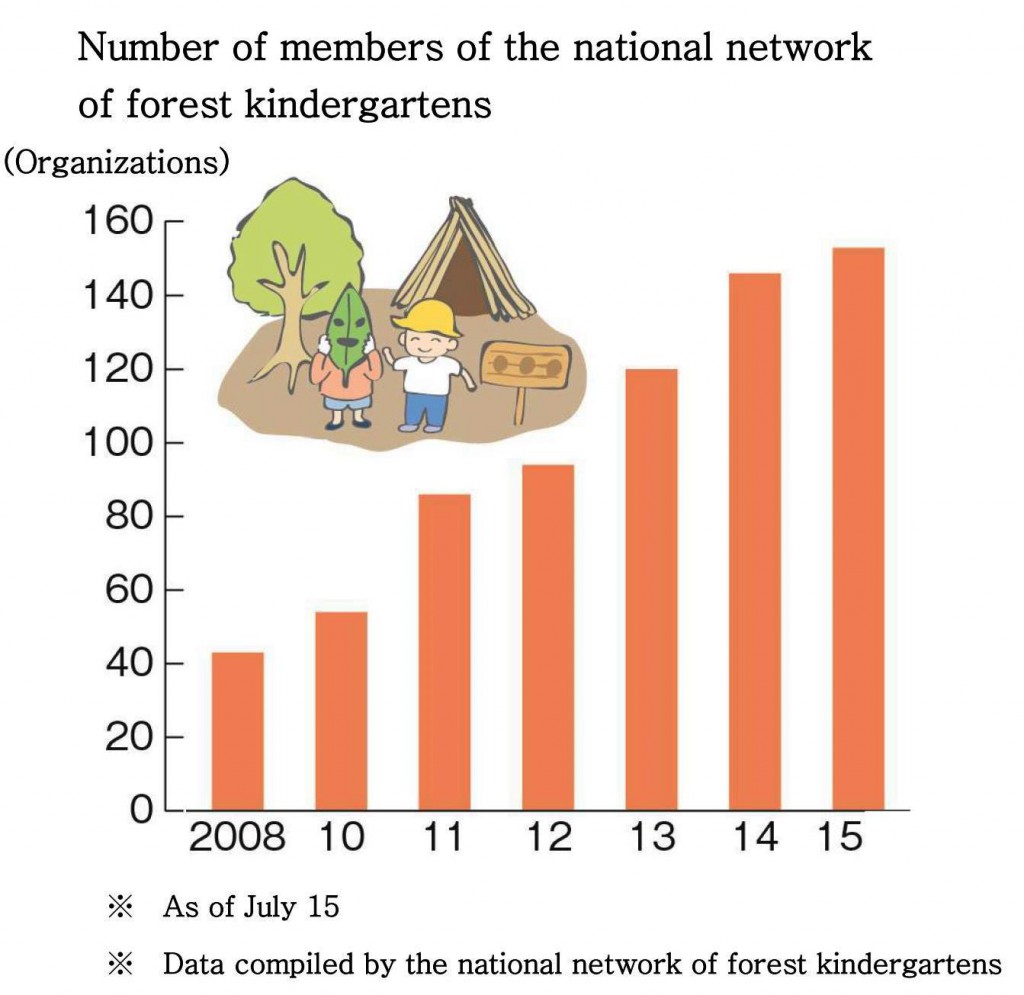Forest kindergarten programs, which let preschool children play and learn in a natural environment such as mountains and rice paddies, are becoming increasingly popular in Japan. Spending time outdoors in nature is believed to have a positive impact on children’s development both physically and mentally.
Local governments have begun providing assistance to the programs to encourage young families to move in to depopulated rural villages.
Forest kindergartens first started in Denmark and Germany as outdoor nurseries without ceilings or walls. In Japan, similar activities are introduced by kindergartens, nurseries, afterschool classes and private childcare groups. According to the national network of forest kindergartens, children of such kindergartens play in places like beaches, woodlands, fields and parks.
Activities vary from exploring in the forests to playing in the mud, differing depending on the season and regions. Operating days and hours also differ according to organizations. Some kindergartens are open on all weekdays, while others are only open on weekends or during summer holidays for children and parents to participate in.
The common characteristic of the programs is that adults basically just watch over children as they play in the nature and let them think what they want to do.
It is unclear how many forest kindergartens exist in Japan, but the number of organizations in the national network was 153 in July, up from 43 when the network was set up in 2008. “There are less opportunities for children to experience playing in a natural environment not only in urban areas but also in rural areas, and (forest kindergartens) are spreading nationwide as people discover new merits in this type of preschool education,” says Hisao Waragai, head of the network’s secretariat.
Some local governments have taken outdoor nurseries as a trigger to revitalize their regions by attracting young people who hope to raise their children in a natural environment.
Tottori Prefectural Government set up a certification system for outdoor nurseries in March. Under the system, the prefectural government provides grants to organizations which meet the requirements such as the minimum outdoor operation hours and safety measures. The first forest kindergarten in the prefecture opened in the town of Chizu in 2009, and currently six organizations offer such programs. As much as 40 percent of the children in one of the organizations are those who moved in from outside the prefecture, and the prefectural government hopes outdoor nurseries can become the key to inviting more people into the region.
In Nagano, where outdoor nurseries were introduced in the 1980s, the prefectural government established a certification system for such organizations in March. It offers training classes for the organizations and encourage networking among them. According to the prefectural government, 16 organizations, the highest number nationwide, currently operate in the prefecture. “As playing with computer games and the Internet spreads even among children in rural areas, more people are attaching importance to activities in a natural environment,” a prefectural government official said. “We hope to support such activities through the system.”
The national network of forest kindergartens expects to hold a forum in Isahaya, Nagasaki Prefecture, in November. When the forum was first held in 2005, the number of participants was a little less than 80, but it rose to 283 last year. “Outdoor nurseries are steadily increasing. We hope to propose a greener lifestyle to people who are raising children,” stresses Hisashi Ikeda, head of the organizing committee.
(Aug. 23, 2015)


